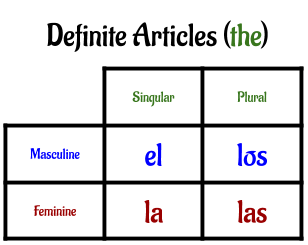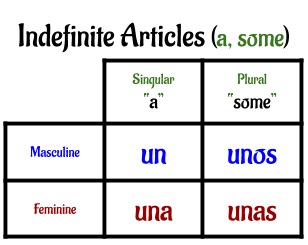Number and Gender of Nouns
|
|
In Spanish, all nouns have a "gender," which is not very common in English. The two gender forms are either Masculine or Feminine in nature and it has nothing to do with what one thinks is "masculine" or "feminine." There is a pattern in the language that indicates whether a noun is going to be masculine or feminine and it is determined by which letter it ends with.
The big ideas to be understood and learned from this concept are:
1) Identify the Gender of nouns
The way to identify if a word is FEMININE, is if it ends with:
D -ión Z A
The way to identify if a word is MASCULINE, is if it ends with:
L O N E R S
Some exceptions are those nouns that refer to people or animals. In these cases, the gender will follow the sex of the animal or person.
Ex. madre (f) = mother; mujer (f) = woman
*This method of identification will work 95-98% of the time. One has to careful of the exceptions, but they are few.
2) Making nouns SINGULAR or PLURAL
3) Article agreement and translation in English
There are two types of articles:
The big ideas to be understood and learned from this concept are:
1) Identify the Gender of nouns
The way to identify if a word is FEMININE, is if it ends with:
D -ión Z A
The way to identify if a word is MASCULINE, is if it ends with:
L O N E R S
Some exceptions are those nouns that refer to people or animals. In these cases, the gender will follow the sex of the animal or person.
Ex. madre (f) = mother; mujer (f) = woman
*This method of identification will work 95-98% of the time. One has to careful of the exceptions, but they are few.
2) Making nouns SINGULAR or PLURAL
- If the word ends with a VOWEL (a e i o u), add ¨-s¨
- ex. blanco -> blancos casa -> casas
- If the word ends with a CONSONANT (all other letters), add ¨-es¨
- ex. papel -> papeles ciudad -> ciudades
- Be aware that words ending with a "z", change to a "c" when made plural.
- ex. lapiz -> lapices
3) Article agreement and translation in English
There are two types of articles:
4) Adjective agreement with the noun
- Adjectives describe a noun. Unlike English, in Spanish the adjective typically follows the noun and it will agree with the noun in NUMBER and GENDER.
- Adjectives that naturally end with an "o" will agree in Gender AND Number
- ex. el gato blanco, la casa blanca, los gatos blancos, las casas blancas
- Adjectives that end with other letters, (i.e. azul, grande, amable, etc.) will be gender NEUTRAL, they will not agree in gender, but will agree in number only.
- ex. la camisa azul, las camisas azules


